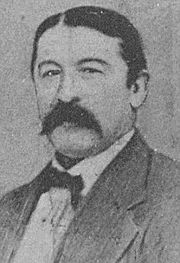John Gordon (convict) facts for kids
Quick facts for kids
John Gordon
|
|
|---|---|
 |
|
| Born | 1815 |
| Died | February 14, 1845 (aged 29-30) Providence, Rhode Island, U.S.
|
| Cause of death | Put to death by hanging |
| Criminal status |
|
| Conviction(s) | Serious crime (later pardoned) |
| Criminal penalty | Death |
John Gordon (born 1815 – died February 14, 1845) was the last person put to death by the state of Rhode Island. Many researchers believe his trial and execution were unfair. They think it was because of strong feelings against Roman Catholics and Irish immigrants at the time. Because of this, he was officially pardoned in 2011, long after his death.
Contents
The Case of John Gordon
In 1844, John Gordon was tried for the death of Amasa Sprague. Sprague was a factory owner in Cranston. He died on December 31, 1843, after being beaten. Sprague came from a very important family in Rhode Island. His brother, William, was a U.S. Senator.
A Business Dispute
Six months before Amasa Sprague's death, he had a problem with John Gordon's family. Sprague's factory workers often visited a business owned by Nicholas Gordon. Nicholas was John Gordon's brother. Amasa Sprague used his family's power to have Nicholas Gordon's business license taken away. Nicholas and John Gordon were Roman Catholic immigrants from Ireland.
The Trial and Verdict
Nicholas, John, and another brother, William Gordon, were all tried for Amasa Sprague's death. However, only John was found guilty. The evidence against him was not clear and seemed to contradict itself. William was found not guilty. In Nicholas's trial, the jury could not agree on a verdict.
John Gordon was put to death by hanging in the state jail in Providence. The judges in all three trials also acted as the final court of appeal. One judge, Justice Job Durfee, even told the jury to trust witnesses from "Yankee" backgrounds more than Irish witnesses. This showed a clear bias.
The Death Penalty in Rhode Island
Seven years after John Gordon's execution, Rhode Island stopped using the death penalty. It was brought back in 1872, but no one was executed. The state finally ended capital punishment for good in 1984. In the 1990s, when people talked about bringing back the death penalty, John Gordon's case was often used. It showed the risks of putting people to death, especially if the trial was unfair.
A Posthumous Pardon
In 2011, a writer named Ken Dooley created a play. It was called "The Murder Trial of John Gordon." The play showed how unfair Gordon's trial had been. State Representative Peter Martin watched the play. He then asked Governor Lincoln Chafee to officially pardon John Gordon.
Governor Chafee's Decision
The Rhode Island General Assembly supported the idea of a pardon. Representative Peter F. Martin and Senator Michael McCaffrey helped pass the resolution. On June 29, 2011, Governor Lincoln Chafee officially pardoned John Gordon. Governor Chafee signed the pardon at the Old State House. This was the same building where Gordon's trial happened more than 150 years earlier.
International Recognition
In September 2014, Enda Kenny, who was the leader of Ireland (called the Taoiseach), visited Rhode Island. He spoke at the Irish Famine Memorial. In his speech, he praised Representative Martin and Governor Chafee for pardoning John Gordon.
See also
- List of most recent executions by jurisdiction
- List of wrongful convictions in the United States
 | DeHart Hubbard |
 | Wilma Rudolph |
 | Jesse Owens |
 | Jackie Joyner-Kersee |
 | Major Taylor |

